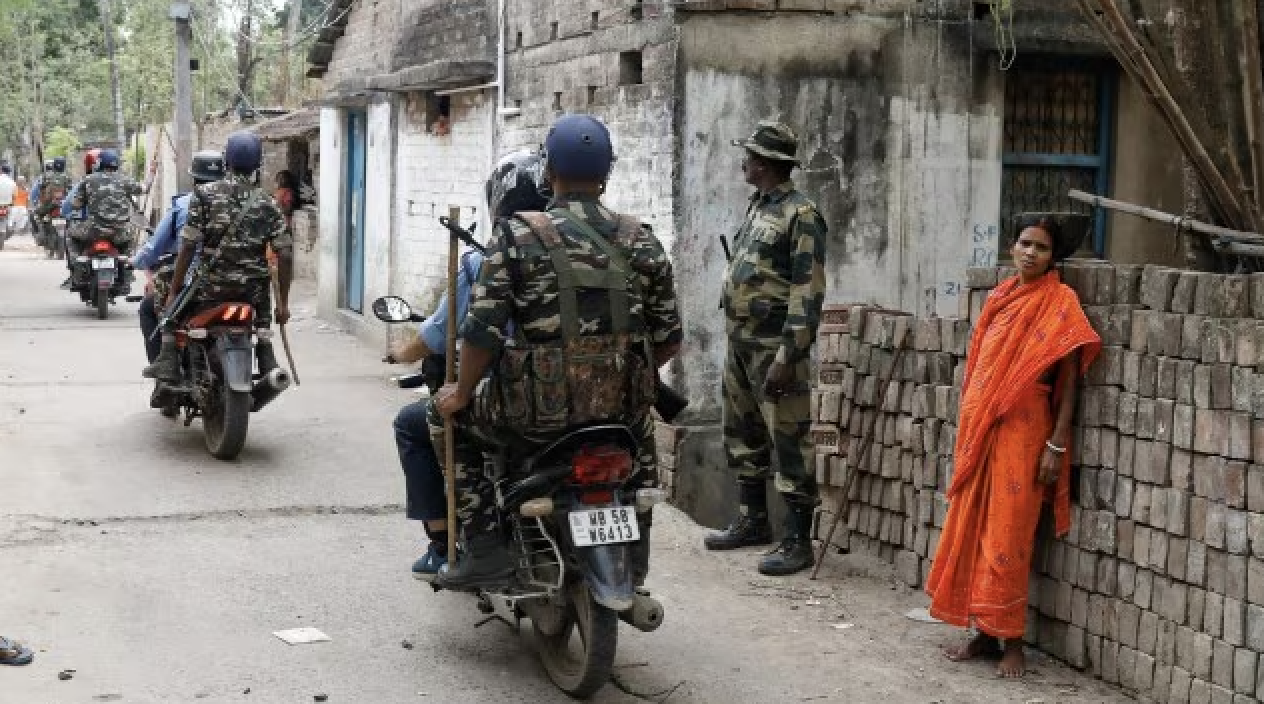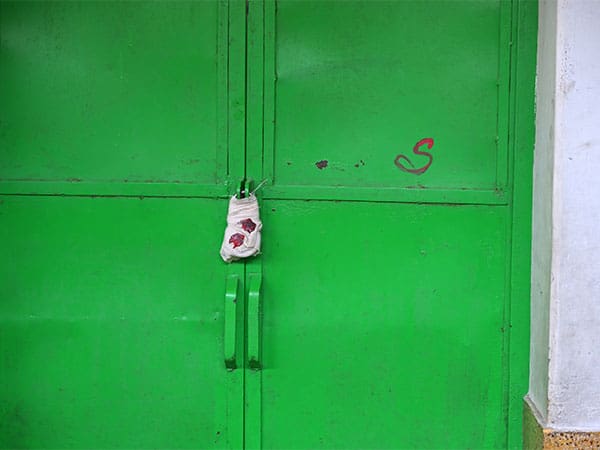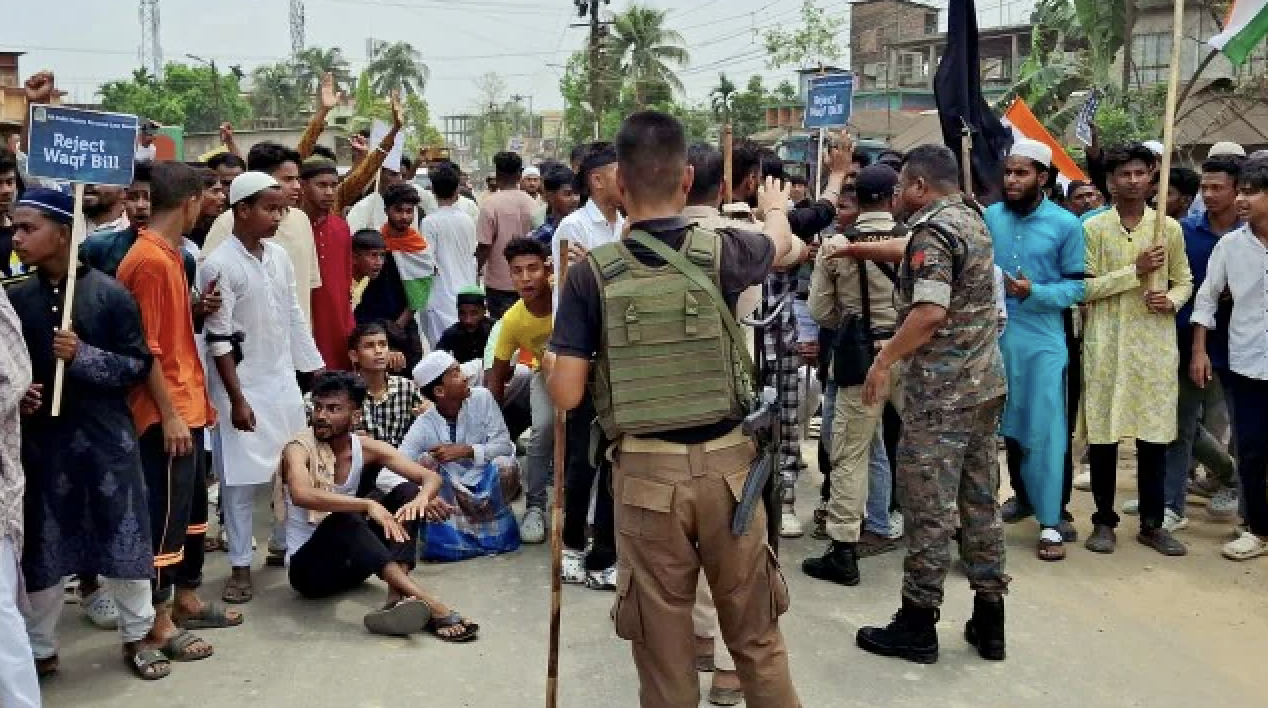
Audrey Truschke is the Director of the Asian Studies program at Rutgers University, Newark. Her scholarship focuses on South Asia and she’s been a vocal critic of Indian Prime Minister Narendra Modi and his Hindu nationalist government. Her writings and teachings, as well as her politics have won her tens of thousands of followers online, but also a steady stream of violent threats.
“Mind your own business u bitch I m Hindu I m kindly request you stop spreading rumours about my Hinduism#my religion otherwise u will be killed by someone don’t underestimate us we don’t forgive our enemy we believe in peace don’t hurt our emotions,” read one tweet aimed at Truschke, from May.

Truschke and other American scholars say they’re increasingly dealing with threats, doxxing, and harassment based on their critique of Modi, their defense of minority rights in India, or simply the nature of their research.
In response, they’re organizing. They’ve formed the South Asia Scholar Activist Collective or SASAC. And this month they published the “Hindutva Harassment Field Manual.”
“Hindutva” is the term broadly used to describe Hindu nationalism and militancy, which have increasingly threatened minority rights in India. In its latest rankings, the democracy monitor Freedom House downgraded India from a “Free” country to “Partly Free,” and said the democracy, which threw off the yoke of British colonialism in 1947, had experienced the greatest decline in scores among the 25 largest democracies. The Modi government and its allies have targeted student protesters and scholars within India, but now American academics are in their sights.
“The Hindu right will not leave me alone,” said Truschke, “and their attacks on me and many of my colleagues have become so persistent and so virulent and so violent and so dangerous that it is imperiling everything that we hold dear, from our personal safety, the safety of our families, including our children to our academic freedom.”
SASAC comprises scholars of different religious backgrounds from a number of prominent universities, including Yale, Georgetown, and Columbia. Within the Hindutva Harassment Field Manual, there are tips for dealing with threats (“There is no exact formula of when you should report Hindutva harassment to the police.”) as well as a section on “Bad Faith Bias Claims.”
“Hindutva harassment often invokes the language of social justice and antiracism,” it notes.
Vinayak Chaturvedi teaches at the University of California, Irvine. He said he has been the target of harassment for years, mostly owing to his scholarship on Vinayak Savarkar. Savarkar is widely credited with developing Hindutva ideology and was inspired by the Nazi party, and in turn inspires Prime Minister Modi.
In an incident Chaturvedi recounted in the Indian press, he was speaking on the phone with his father when he heard his mother exclaim, “There are so many police outside!”
It was a S.W.A.T. team.
His father, he wrote, “opened the front door to find several policemen on the porch, pointing assault weapons at him.”
They were summoned to the home after an anonymous call to the police, claiming that Chaturvedi’s mother was seen shooting someone with a shotgun during a Zoom call. This is what’s known as being “swatted” and is a tactic of the alt-right and other networks.
While the harassment is often serious, some Hindu community leaders say they have legitimate grievances with certain scholars, and should not be conflated with online trolls.
“We have categorically said that threats—or instances of threats—against anybody is condemnable because we don’t subscribe to any of that stuff,” said Nikunj Trivedi, the president of the Coalition of Hindus of America, or COHNA.
Trivedi organized a letter criticizing Truschke. The letter, addressed to Jonathan Holloway, the president of Rutgers and other university officials, was signed by 75 Hindu temples and religious institutions across the U.S. In it, they addressed several instances in which they allege Truschke’s scholarship and statements “caused intense trauma” to Hindu students and the broader Hindu community.
One of the episodes concerns her interpretation of the Ramayana, one of the central epics of Indian literature and core to the Hindu faith. Truschke argued on Twitter that the main character Sita angrily referred to her husband, the Hindu god Rama, as a “misogynist pig.”
Because she used this phrase in the context of one of the most sacred Hindu texts, Truschke drew instant condemnation on Twitter, and in the Indian press.
An article in the Deccan Chronicle argued that “many intellectuals and people who have read the various versions of the great epic claim that Audrey’s translations are baseless and unethical.”
Truschke replied that she was merely drawing from an existing translation of the Ramayana by Robert Goldman, a professor of Sanskrit at Berkeley. In his own text, however, Goldman writes that Sita accused Rama of “harboring feelings of misogyny,” an arguably milder phrase. Truschke noted that she was “loosely translating” Goldman and has, since then, defended her right to use colloquial language in order to reach modern readers. (For his part, Goldman publicly distanced himself from Truschke, describing her language as “inappropriate” and arguing that “Sita would never have used such language about her husband, even in the midst of emotional distress.”)
Some Hindus argue that these are not individual lapses or points of intellectual disagreement so much as evidence of institutionalized hostility toward Hinduism, embedded within academia. Many increasingly use the term ‘Hinduphobia.’
In April, students at Rutgers organized a virtual “Understanding Hinduphobia” conference.
“I strongly believe that academia in the United States discourages Hindus from publicly stating their religious views and values through accusations of misogyny and caste discrimination,” said one student during the conference.
Notably, the student did not appear on-screen while speaking, nor did she identify herself. This is part of the challenge. Students who say they’re victims of Hinduphobia, but are not willing to attach their names and faces to their complaints. They and their allies say it’s because they’re afraid, and that this is itself evidence of the problem. Their ideological opponents say otherwise.
Shreeya Singh, a Hindu student at Yale who created the group Students Against Hindutva Ideology, said the term ‘Hinduphobia’ was selectively deployed against scholars.
“When it comes to members of the academy, the term seems to be used as a silencing tactic, rather than a legitimate effort to actually address instances of hate,” said Singh.
Simran Jeet Singh (no relation to Shreeya Singh), a visiting scholar of religion and South Asia at Union Theological Seminary and part of the collective that published the manual, agrees. He compared the current debate within the Indian-American community and those who study India to what’s happening in the American racial discourse, where conservatives are demonizing scholars who teach critical race theory.
“What we see in both the American context and in the Indian context is a desire from the right to bring forward a vision of history that fits into their cultural, supremacist worldview,” said Singh.
He called it a “victimization narrative,” a point echoed by Chaturvedi, who said that in their own eyes, “Hindus were the victims of Muslims. Hindus were the victims of Christians, Hindus were the victims of the British, of the Portuguese, of other powers.”
Perhaps the most prominent person to cite “Hinduphobia” is Tulsi Gabbard, the former member of Congress and Democratic presidential candidate.
“Unfortunately, Hinduphobia is very real. I’ve experienced it directly in each of my campaigns for Congress & in this presidential race,” she tweeted last year. “Sadly, our political leaders & media not only tolerate it, but foment it.”
And yet, Gabbard also came under fire for aligning with Modi and his supporters. An analysis by the Intercept found that “dozens of Gabbard’s donors have either expressed strong sympathy with, or have ties to the Sangh Parivar — a network of religious, political, paramilitary, and student groups that subscribe to the Hindu supremacist, exclusionary ideology known as Hindutva.”
Dheepa Sundaram, who teaches Hindu Studies at the University of Denver and is a member of the SASAC, is Hindu and grew up in upstate New York in the 1970s.
“I certainly got asked questions like, ‘Are you a woo-woo Indian, or a dot Indian?’ Those are racist attacks that were linked to my Hindu identity.”
In that era, Hindus found their traditions distorted and mocked in popular culture. The film Indiana Jones and the Temple of Doom notoriously depicted a fictional Hindu cult ritual ending in human sacrifice. In New Jersey, a group called the Dotbusters terrorized and even killed Indian immigrants between the 1970s and 1990s. It took its name from the bindi worn on the foreheads of Hindu women.
Still, Sundaram takes issue with contemporary use of the term ‘Hinduphobia,’ saying it co-opts the term ‘Islamophobia,’ and the experiences of Muslims in America, who have been subjected to a recent travel ban under President Donald Trump that was only reversed by President Joe Biden in January 2021.
“Hindus are not structurally vulnerable in the United States,” she said, even if they experience individual acts of racism.
A recent report from the Carnegie Endowment for International Peace surveyed 1,200 Indian Americans, including Hindus, Muslims, and members of other faith traditions. Eighteen percent of the Hindu respondents said they’d experienced religious discrimination in the past year. However, more than twice as many Muslims, 39 percent, made the same claim.
“Muslims who are of Indian origin experienced much worse discrimination,” said Milan Vaishnav, the Director of the South Asia Program at the Carnegie Endowment and co-author of the report.
In the wake of the campaign against Truschke, Rutgers University issued a statement that it “emphatically supports” her.
“Scholarship is sometimes controversial,” read the statement, “but the freedom to pursue such scholarship, as Professor Truschke does rigorously, is at the heart of the academic enterprise.”
The university’s statement went on to emphasize that it “emphatically affirms its support for all members of the Hindu community.”






